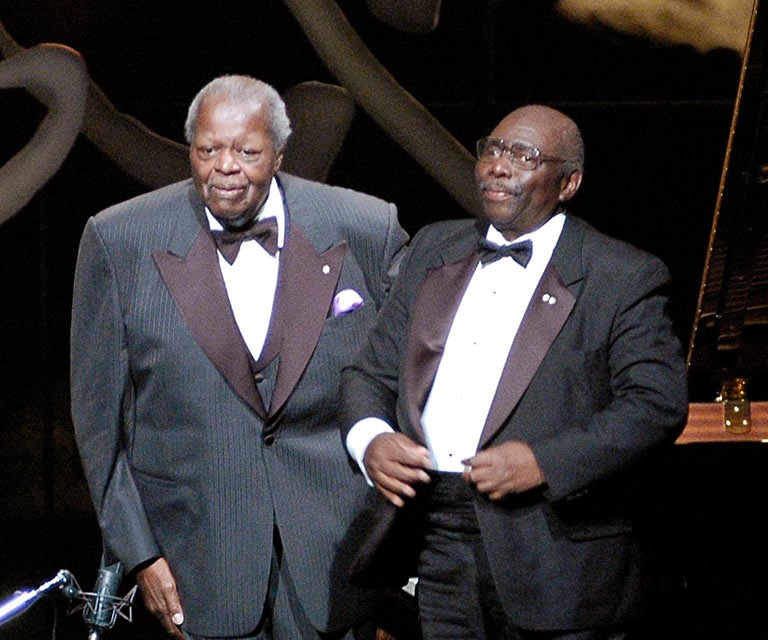
A couple of months ago, there was the sad, but expected, news that this year’s Montréal Jazz Festival (officially the Festival International de Jazz de Montréal – FIJM) was cancelled due to the pandemic. Then came the great news that there would be a free virtual Festival from June 27 to 30. One of the few upsides to the pandemic is that music is continuing with numerous online events. Although live and in-person musical performances are special and unforgettable experiences, there is something to be said in favor of other kinds of musical presentations. Recordings, documentaries, and videos capture moments in time, allowing them to be saved for posterity, and they can be enjoyed and savored endlessly by countless people.
The FIJM is one of the largest and best live musical celebrations in the world, and that shared experience is missed. However, one of the best things about a virtual concert or festival is its availability all over the world, to people who otherwise would not be able to attend the live musical event.
These unusual times call for unusual measures, so it’s wonderful to see so many organizations and individuals stepping up to the plate and providing music. Even when things get back to normal, whenever that may be, it won’t be forgotten how artists and musical establishments helped to entertain and calm people who were under stress during this challenging time, and how audiences in turn supported the musicians.
This special virtual edition of the FIJM was presented by TD Bank Group in collaboration with Rio Tinto and its public partners.
Saturday, June 27
On June 27, the 2020 virtual FIJM started on Canadian Multiculturalism Day, and the line-up was fully reflective of the meaning of the day. Myriam Fehmiu, journalist/presenter on Radio-Canada, was the host throughout the Festival. Myriam was joined by Jacques-André Dupont, Festival President-Director General, and Laurent Saulnier, Festival Vice President of Programming, and they welcomed the viewers in French. All the festivities took place at L’Astral Club, in the heart of the Festival location, and a Facebook link at www.montrealjazzfest.com gave the online audience free access to all the concerts.
Between sets, clips were played from past Festivals that showed the vibrancy of the events, as well as the huge variety of performers who have appeared.
Malika Tirolien
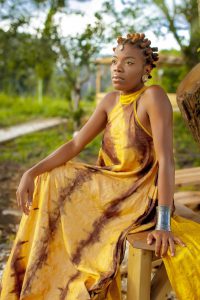
The festivities began with a performance by Gaudeloupe-born, Montréal-based singer/keyboardist, Malika Tirolien. Malika has been a member of Groundfood, The Kalmunity Vibe Collective, and the dynamic multicultural and multilingual group Bokanté. In collaboration with Snarky Puppy, she wrote and sang on the 2013 Grammy-winning album Family Dinner – Vol. 1. She released her first album in 2014, Sur La Voie Ensoleillée, and picked gems from that album to fill much of her Festival set. Malika started her show with the moving “Oliassa,” which showcased her rich, soaring vocals. She was given excellent support by the very talented trio of guitarist Philippe Lallier, keyboardist Jean-Michel Frédéric, and drummer Jephté Kalombo. The group segued into an upbeat and beautifully melodic “Patience,” and seamlessly entered the sweet tune “Sew,” including a stellar drum solo from Kalombo, and great percussive keyboard accents throughout by Frédéric. Tirolien’s set was sometimes haunting and retrospective, with a mixture of up-tempo servings, and some great rapping and scatting. The next selection was the beautiful ballad “So Long Ago,” which included a brilliant guitar solo by Lallier. This was followed by a pair of songs with a social conscience, “Revolution” as well as “Réparasyons” from the Bokanté and Metropole Orkest album What Heat. Also, included in the set was the flowing and harmonically strong Bokanté gem, “Héritier.” Tirolien sang in either French or English throughout her set, depending on the song’s origin. However, whichever tongue was used, the strength of Malika’s stirring clear vocals shone through, proving once more that music is the universal language. This show was a fabulous beginning to the virtual Festival!
Rafael Zaldivar
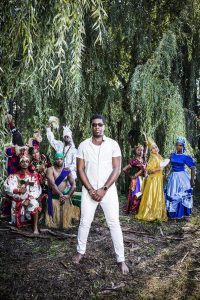
Afro-Cuban pianist Rafael Zaldivar started his set with a bang, playing a driving, percussive “A Rock con Leche” from his newest album, Consecration, with Rafael showing his handheld keyboard skills on a solo. He was accompanied by bassist Remi-Jean LeBlanc, drummer Louis-Vincent Hamel, and percussionist Elli Miller-Maboungou. During the show, several people commented live from all over the world, including one that said, “Jazz is life, period!” This was a scintillating high-energy show, with all the musicians matching each other note for note. It wasn’t a long set, but it was a wonderfully heart-racing experience for the viewers.
Djely Tapa
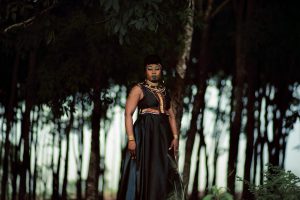
Mali-born singer Djely Tapa’s debut CD Barokan was nominated for World Music Album of the Year at the 2020 Juno Awards. Prior to releasing Barokan, she was associated with the group Afrikana Soul Sister. Djely came out on stage wearing an eclectic multi-length outfit and brandishing a large feather duster like a wand. She was joined by bassist and laptop player Jean-François Lemieux, guitarist Assane Seck, and drummer Auguste Donatien Dogbo. The world music they played was like a travelogue, transporting the viewers to far-away places in the most sublime way. Djely wasn’t just an engaging singer, she also danced enthusiastically throughout the set, obviously having a great time.
Clerel
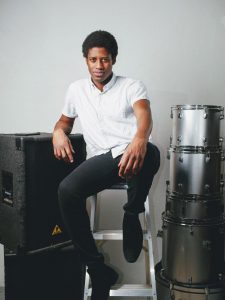
Singer/guitarist/songwriter Clerel was born in Cameroon and is based in Montréal. His wide-ranging influences include Michael Jackson, Fela Kuti, Donny Hathaway, Al Green, Cesária Évora, and Gregory Porter. He played a duet set with electric guitarist Kento Kataoka, starting with an evocative island-flavored number. He performed songs from his recent EP, Songs From Under a Guava Tree, including “Kiss the Whole World,” a bluesy song that changed tempos throughout, and it was a toe-tapping delight. He also played some beautiful ballads, including “Blackstone” in a lovely, intimate way. Clerel has a natural charisma that shines so brightly, even in a virtual concert.
Bïa

Vocalist/guitarist Bïa was born in Brazil, and she sings in French, Portuguese, and Spanish. She was a 2007 Juno World Music Award nominee. She is a living embodiment of Multiculturalism, since as a child, her family was forced to flee from Brazil due to exile. They lived in Chile, Peru, and Portugal, before returning to Brazil after the Brazilian Amnesty Law was enacted. She currently splits her time between France and Quebec, and she has appeared five times at the Festival. During her show, she was excellently backed by cellist Sheila Hannigan, bassist Dan Gigon, and drummer Sacha Daoud. The group performed a beautiful bossa nova-inspired song, and Bïa started her next laid-back ballad with some lovely melodic whistling, then she deftly imitated a trumpet, creating a truly charming rendition. Next came some fine gypsy-jazz with outstanding work by cellist Sheila Hannigan. The final song was a wonderful Brazilian-flavored samba that she started a cappella, then the other musicians chimed in for a great set-ender.
Oscar Peterson and Oliver Jones 2004 Treasures of the Festival Concert
Oscar Peterson was called “The Maharaja of the Keyboard” by Duke Ellington. In a career that lasted over 60 years, he won several Grammy Awards and numerous other honors. He was the first winner, in 1989, of the FIJM prize named after him, the Oscar Peterson Award, which recognizes a performer’s musicianship and exceptional contribution to the development of Canadian jazz. He released over 200 recordings and played thousands of concerts across the globe.
Oliver Jones started as a student of Oscar Peterson’s sister, Daisy Peterson Sweeney. Jones received a Juno Award and several Félix Awards. He was the second recipient of the Festival’s Oscar Peterson Award in 1990, and that same year, he was the subject of a documentary by The National Board of Canada, Oliver Jones in Africa. In 1993, he was named an Officer of the Order of Canada.
A Festival concert with these two piano legends took place on July 10, 2004 at the Wilfrid-Pelletier Theater, and it was a highly anticipated, sold-out event. Festival founders Alain Simard and André Ménard introduced the musicians one by one, starting with drummer Alvin Queen, then bassist Niels-Henning Ørsted Pederson, electric guitarist Ulf Wakenius, and the legendary pianist Oscar Peterson! Despite enduring some significant health problems, including a stroke in 1993, Oscar still played with such verve, energy, and style, that it’s clear why he was considered a worldwide jazz icon. The group played the sprightly “Reunion Blues,” then performed a gorgeous ballad, “When Summer Comes,” followed by the atmospheric and moody “Nighttime.” Oscar talked about the passing of Norman Granz, Ray Brown, and John Lewis, and how he was inspired by those deaths to compose “Requiem” a beautifully somber lament. Peterson was visibly moved at the end of this song, which was really appreciated by the packed audience. Then came an immensely fun boogie-woogie that spotlighted each player, and a spirited rendition of “Satin Doll.” The show continued with a wide variety of jazz, and some classical music riffs thrown in for good measure. The set also included “Cakewalk,” and “Wheatland.” The musicians communicated with each other on such a high level, it was incredibly impressive.
Then Oliver Jones came out to thunderous applause and joined the band. Oscar and Oliver performed a version of “Just Friends” that was a divinely inspired duet where they played off each other like they were born to do it. Then they gave a stunning performance of “Hymn to Freedom” that really took the crowd to church! Seeing these two illustrious pianists together was a feast for the senses, and they more than deserved the extended standing ovation they and their fellow musicians received at the end.
Pierre Kwenders
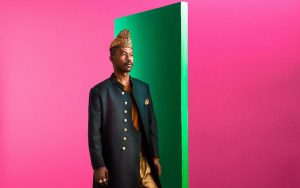
Congolese/Canadian musician Pierre Kwenders sings and raps in English, French, Lingala, and Tshiluba. He immigrated as a teenager with his mother to Canada, and he is known for combining African music with Western pop, hip-hop, and electronic music. In 2015, he was nominated for a SOCAN Songwriting Prize. Kwenders’ set was the after-party end to the first evening of the virtual FIJM. Pierre came onstage dressed in shades and a cool red hat, and he was accompanied by Olivier Pépin on guitar. The show was interactive, with videos playing graphics behind the performers by VJ Boycott, artist Kando doing a painting, and a spectacular special-effects light show. The music was evocative with several influences perfectly matching the visual presentation. At one point, Kwenders said, “Let’s take a moment to go back to the Motherland,” and followed with some intense, African-infused music, mixed with techno. Pierre was a bundle of energy, dancing throughout the set.
Sunday, June 28
Jordan Officer

Jordan Officer is a Canadian guitarist who performs jazz, blues, and country, and he has been a Festival staple with many sold-out shows, ever since he opened for Ray Charles in 1998. He has frequently collaborated, recorded, and performed with fellow Canadian musician Susie Arioli. One of Officer’s biggest influences was Benny Goodman’s guitarist, Charlie Christian, and he is particularly fond of the swing era. Jordan was joined by bassist Sage Reynolds and drummer Richard Irwin. The show started with a ballad, with Officer showing great dexterity on the guitar. The set included “Found It All,” “When We Were Just Two,” and a sultry “Pennies From Heaven” with a brilliant bass solo by Sage Reynolds. Jordan also performed a Cajun-inspired tune where he played the fiddle, and he followed with a few more fiddle-centric melodies. It had the real feeling of a jazz-influenced hoedown. Officer gave a shout-out to Eddie Lang (who was called the “Father of the Jazz Guitar”) with an emotional “A Little Love, A Little Kiss.” After a short interview with Myriam Fehmiu, the group ended their set with some swinging honky-tonk.
Mateo
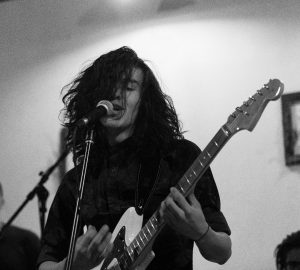
Juan Mateo Barrera Gonzalez, known by his stage name of Mateo, is a Colombia-born musician who moved to Montréal at the age of 19. He has been influenced by the sounds of Colombia, salsa, Afro-beat, rock, and blues. He received the 2020 Artiste Révélation Prize from Radio-Canada. At the 2019 Canadian Latin Awards, he was nominated for Best Male Vocalist of the Year. The set highlighted songs from Mateo’s latest album Vengo De Frente, beginning with his soulful vocals on “Miralo,” and segued into the high-energy “Camaleón.” Mateo was supported by vocalist/drummer Dan Fiyah Beats, bassist Diego Cruz, and guitarist Tito Sono. The next offering was the romantic, plaintive bolero-paced “Náufrago,” with a fine guitar solo by Tito Sono. The group’s music was quite expressive throughout, ending their set with a catchy tune, “Aguacero.”
Marianne Trudel Trio with Morgan Moore and Robbie Kuster

Marianne Trudel is a multi-faceted Canadian pianist/composer/arranger. She has had musical partnerships with the likes of Karen Young, Ingrid Jensen, Chucho Valdés, John Hollenbeck, Tony Malaby, and Kenny Wheeler. She has also worked with L’Orchestre National de Jazz de Montréal, which includes some of the cream of the crop of Montréal musicians, like Jean-Pierre Zanella, Christine Jensen, André Leroux, Jean-Nicolas Trottier, and Samuel Blais. She has made seven recordings as a leader.
Bassist and producer Morgan Moore is a Juno Award winner, and he has toured worldwide.
Drummer Robbie Kuster was born in Switzerland and adopted Montréal as his home in 2000. He has performed with Yannick Rieu, Patrick Watson, and Philippe Lauzier.
Marianne Trudel was joined by her fellow musicians, and they played one long song, a lovely minor-key, emotionally powerful ballad.
Jeremy Dutcher
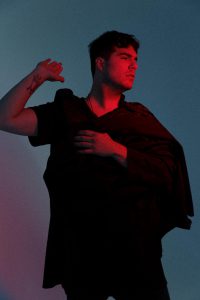
Jeremy Dutcher is a classically trained indigenous Canadian tenor, composer, musicologist, and activist. He is a member of the Tobique First Nation of New Brunswick. His debut CD, Wolastoqiyik Lintuwakonawa won the 2018 Polaris Music Prize, and in 2019, the CD won the Juno Award for Indigenous Music Album of the Year. After studying music and anthropology at Dalhousie University, and his classical training as a tenor, he incorporated the traditional song stylings of his community into his music. His show began with a piercingly beautiful chant while accompanying himself on piano, and Jeremy had great support by cellist Blanche Israël. The set was filled with poignant and evocative songs, and it was a balm for the soul.
Charlotte Cardin
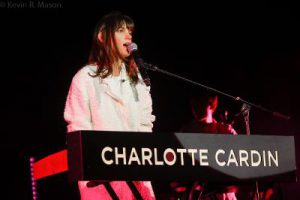
Canadian singer/songwriter/pianist Charlotte Cardin includes pop, techno, and jazz influences in her music. In 2017, she was nominated for a SOCAN Songwriting Prize, and in 2018, she received two Juno Award nominations, for Breakthrough Artist of the Year and Songwriter of the Year. For her set, Charlotte’s clear soprano voice was backed impeccably by Benjamin Courcy on drums and Mathieu Sénéchal on bass and keyboards. In an intimate show, her songs included “Like It Doesn’t Hurt” and “Main Girl.”
Jaco Pastorius Treasures of the Festival Concert
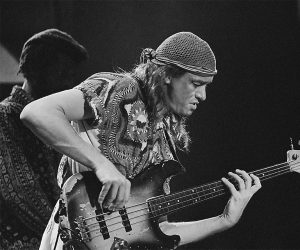
The evening ended with the 1982 concert by jazz bassist Jaco Pastorius, who was a member of Weather Report from 1976 to 1981. He worked with Pat Metheny, Joni Mitchell, Flora Purim, Mike Stern, Al Di Meola, Wayne Shorter, Michael Brecker, Toots Thielemans, Jack DeJohnette, and many others. He was inducted into the DownBeat Jazz Hall of Fame in 1988, and he received several Grammy Award nominations. Although his life was plagued with many difficulties, and he died much too young at 35 after a fight outside a bar in Florida, his work continues to influence musicians. He was also the subject of a 2014 documentary, Jaco.
Jaco’s show started with some funky jazz that showed off his excellent chops. The outstanding band was made up of drummer Peter Erskine, Othello Molineaux on steel drums, Don Alias on congas and percussion, Bobby Mintzer on saxophone and bass clarinet, and trumpeter Randy Brecker. There wasn’t much talking, but this show was a master class by artists at the top of their game. There was a powerful performance of “America the Beautiful” as a bass solo by Jaco, as well “Donna Lee,” “The Chicken,” and “Mr. Fonebone.” There was everything from bebop and fusion to Caribbean influences, with fantastic solos by each musician. The final song of the evening was “Fannie Mae,” which was sung by Jaco, and all the musicians got their well-deserved time in the spotlight. It was quite the memorable concert!
Monday, June 29
Fredy V. & The Foundation
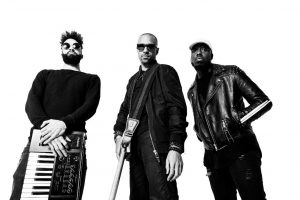
Fredy V. is a singer/songwriter/multi-instrumentalist who made his mark as part of The Kalmunity Vibe Collective in Canada. Wearing a Black Lives Matter t-shirt, Fredy V. started his show with a driving, “Down For Me.” Then, a voice-over recounted the grim facts of the Trayvon Martin and George Floyd cases and the protests that have arisen, in acknowledgement of the unrest across the world. Fredy welcomed the viewers, saying, “It’s so amazing to be here right now, and we’re so happy to be together. It’s been a few months, we ain’t seen each other…but it’s kind of bittersweet, because this is only half of the band. I want to give a sincere shout-out to three members that are not with us: Frank O’Sullivan, David Osei-Afrifa, and Mel Pacifico. We’re sending you guys our love, we miss you guys so much, but we’re going to represent The Foundation for y’all.” They continued with a passionate “My Joy,” followed by the funky “One Step,” where he sang in English, but rapped in French. Fredy V. was joined by Caulder Nash on keyboards, drummer Ronny Desinor, and bass guitarist Paul Charles. Fredy said, “If you want to evolve, sometimes you have to let go and free yourself” as an introduction to “Free Yourself.” After briefly speaking with Myriam Fehmiu, who effusively complimented his music, Fredy V. and the band swung into a super-hot, “Ain’t Going Nowhere.” They continued with the soulful “Fly With Me” and “Intertwine.” He stated, “I didn’t think we were going to have a live show this year, yet here we are. It’s a beautiful thing, y’all!” He ended his fabulous set with the old sign-off by Don Cornelius on the TV show Soul Train, “Peace, Love, and Soul!” This was a real dance party and a true crowd pleaser!
Following the set, there was a clip of vocalist Melody Gardot talking about her experiences at the Festival, and how she once saw at least eight acts in one evening. This was followed by a video of fans from all over the world sending their love and hellos. It was breathtakingly beautiful.
Carl Mayotte

Guitarist Carl Mayotte started playing bars and special events at the age of 16. He has played with ensembles of all sizes and worked with singer Bruno Pelletier. Carl’s concert began with some pulsing fusion. The next song started with a great solo by Mayotte, and the other band members, drummer Stephane Chamberland, keyboardist François Grégoire, and saxophonist Damien-Jade Cyr, all had moments to explore the conversation in this island-influenced tune. The closing was a haunting ballad that soon picked up the pace, changing tempos throughout, and all the players brought their “A” game!
Jack Broadbent
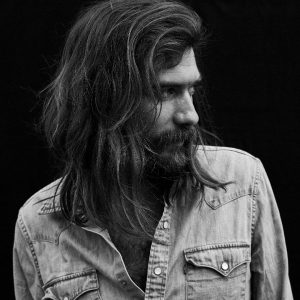
British vocalist/slide guitarist/singer Jack Broadbent grew up listening to Radiohead, Robert Johnson, Joni Mitchell, and Davey Graham, and these legends were a big influence on his distinctive style. He has opened for Peter Frampton, Johnny Hallyday, and Tony Joe White, and he has headlined sold-out shows worldwide. Jack started his set by saying, “Hi, this is Jack Broadbent in Montréal. I want to say a big thank you to the Jazz Festival, and a big hello and warm welcome to everybody who’s listening out there. Peace.” Then he jumped right into the music with “On the Road Again.” Next, he played “If” from his CD, Moonshine Blue, where he sounded like an ensemble, even though he was playing the slide guitar alone on stage. Next came a song Broadbent wrote in London, “She Said,” which he played and sang with power and magnetism. Jack prefaced his last song by saying, “Thanks very much for listening, and thanks to the Jazz Fest for having me. With the current context all over the world right now, it’s time we sat down to have a real discussion before it’s too late.” It was an introduction to the sensitive finale, “Too Late.”
Elisapie
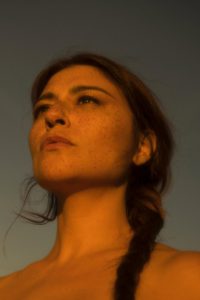
Elisapie is a Canadian Inuk singer/songwriter, broadcaster, documentary filmmaker, and activist. She’s the recipient of a Juno Award for Aboriginal Song of the Year “Taima,” and a nomination for the Canadian Screen Award for Best Original Song, “Far Away.” She started her show with the elegiac “Darkness Bring the Light.” Elisapie said, “I’m so delighted, and so proud, and it feels so good to be with these amazing musicians on this stage in Montréal.” Her band members were guitarist Jean-Sébastien Williams, bassist Joshua Toal, and drummer Pascal Delaquis, and they gave her strong support. She covered “Asuguuq” by the late Inuk country-folk singer Charlie Adams. Her music had a hypnotic feeling, casting a spell over the listeners.
Jean-Michel Blais
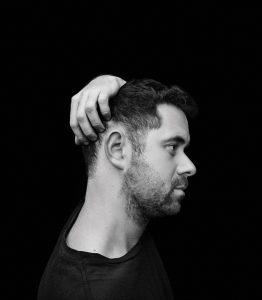
Composer/pianist Jean-Michel Blais has been influenced by many pianists, including Frédéric Chopin, Sergei Rachmaninoff, Maurice Ravel, Steve Reich, and Philip Glass. Jean-Michel’s debut album, II, was released in 2015 and named one of Time Magazine’s Top Ten Albums of the Year. During his set, Blais commanded the stage alone at his piano, playing with stunning musicality, technique, and undeniable talent. Jean-Michel didn’t talk, but with music this beautiful and calming, no words were necessary.
Miles Davis Treasures of the Festival 1985 Concert
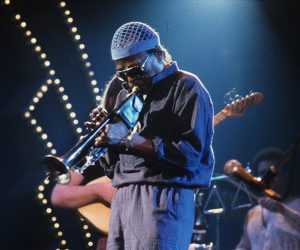
Miles Davis was an American jazz trumpeter, bandleader, and composer, and one of the most acclaimed and influential musicians in jazz history. In his five-decade career, he performed with a Who’s Who of imminent artists, including Charlie Parker, John Coltrane, Red Garland, Sonny Rollins, Bill Evans, Ron Carter, Herbie Hancock, Wayne Shorter, John McLaughlin, and many other notables in music. Davis won eight Grammy Awards, and had 32 nominations. He received several Best Trumpeter honors from DownBeat Magazine and was inducted into their Hall of Fame in 1962. His recording career included the classic albums Kind of Blue, Sketches of Spain, Birth of the Cool, and Miles Ahead. Davis improvised the compelling score for the 1958 French film, Ascenseur Pour L’Echafaud (Elevator to the Gallows). In 1994, FIJM created the Miles Davis Award, to honor a great international jazz musician for their entire body of work and influence in regenerating the jazz idiom.
The concert began with some funky fusion that surely raised the roof on the concert hall. Next came a stunning rendition of Michael Jackson’s “Human Nature,” followed by another incendiary number with several superb solos. Miles was brilliantly backed by guitarist John Scofield, percussionist Steve Thornton, drummer Vince Wilburn Jr., saxophonist Bob Berg, Robert Irving, III on synthesizer, and bassist Darryl Jones. The show included a beautifully romantic version of Cyndi Lauper’s “Time After Time,” “Jean Pierre,” “Code M.D.” “One Phone Call,” and “Something’s on Your Mind.” Near the end of the show, Miles brought each of the musicians to the front of the stage to enjoy the explosive ovation they received, one by one. It was a classic and unforgettable show.
Tuesday, June 30
Jacques Kuba Séguin
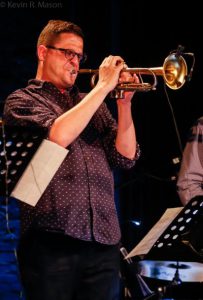
© Kevin R. Mason
For the last 10 years, trumpeter/composer Jacques Kuba Séguin has toured extensively in Eastern Europe. In 2016, a 13-concert tour of Poland, Lithuania, and Germany was the kickoff for the release of album, JKS Litania Projekt With The Bozzini Quartet. He was twice nominated for the Prix Opus in 2015, for both the Jazz Album of the Year, and Concert of the Year for his performance at the FIJM. He just won a Juno Award for Jazz Album of the Year: Solo. He has performed with several musicians on the Montréal jazz scene, including Phillipe Côté, and he took part in Jazzlab and Papagroove. At his concert, after a conversation with host Myriam Fehmiu, the group jumped right into the swing of things with a powerful song that put Jacques’ strong trumpet chops to excellent use. He was accompanied by drummer Kevin Warren, bassist Rémi-Jean LeBlanc, and keyboardist Jonathan Cayer. Their music was sometimes darkly intense and percussive, and at other times it was melancholy. This was a very emotionally moving concert that included “Blues pour les CT,” from his album Odd Lot – Compilation 15 ans, “L’écrivain” and (from the Juno Award-winning album MiGRATIONS), “Transit,” “Never Say Hopeless,” and “I Remember Marie in April” (also from MiGRATIONS).
Naya Ali

Ethiopian-born, Montréal-raised hip-hop artist Naya Ali burst on to the music scene in 2017 with her debut single, “Ra.” Naya has been keeping very busy, playing festivals such as Osheaga, Festival d’été de Québec, Festival International de Jazz de Montréal, La Noce, Le Festif!, Up Here, NXNE, Mural Fest, Montreal en Lumière, Santa Teresa, Montreal Pride, OUMF and FME. She was joined by DJ John Brown for a set that was filled with passionately forceful hip-hop, where Naya alternated between singing and rapping.
Alain Caron Trio with Paul Brochu and John Roney
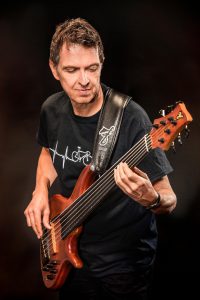
French Canadian Alain Caron is a bass guitarist who started playing at the age of 11, and he started pursuing jazz at 15. He was member of UZEB, a jazz-fusion band, and has performed with Leni Stern and Gino Vannelli. He’s a member of the Order of Canada, a winner of two Félix Awards, and with UZEB, he received the Festival’s Oscar Peterson Award in 1991. Caron plays a special bass made by luthier George Furlanetto.
Paul Brochu is widely considered one of Canada’s top drummers. Along with Alain Caron, he was part of the group UZEB. He is a professor at the University of Montréal.
Pianist/composer John Roney is one of the most active artists on the Montréal music scene. He’s collaborated with Chet Doxas, Effendi JazzLab, Rémi Bolduc, Bernard Primeau, Christian McBride, Peter Erskine, Donny McCaslin, and many others.
Before the set, there was a video of bassist Marcus Miller, who voiced his disappointment at not being able to perform live at this year’s Festival, but he emphasized that he’d be there in 2021. Then Miller introduced the Alain Caron Trio. The group started with compelling, straight-ahead jazz, followed by a gorgeous ballad. Their finale was a fusion of contemporary jazz and bebop, and it made for a fine closing.
Dominique Fils-Aimé
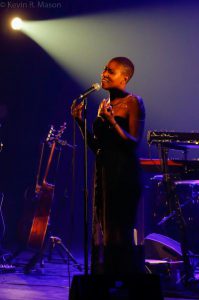
© Kevin R. Mason
Dominique Fils-Aimé is a vocalist from Quebec. In 2018 she released her debut album, Nameless, and she won the 2020 Juno Award for Vocal Jazz Album of the Year for Stay Tuned!
On tape, Chris Illingworth of GoGo Penguin expressed his regrets at not being able to perform at the Festival this year, and said he was looking forward to next year. Then he introduced Dominique Fils-Aimé, who was joined on stage by drummer Salin Cheewapansri and keyboardist David Osei-Afrira. Dominique started her show by solemnly reciting Maya Angelou’s poem, “Still I Rise.” Then she performed a stirring “Nameless.” Her moving set included “Birds,” “Big Man Do Cry,” “Gun Burial,” and the ardently church-infused “Joy River.” Ms. Fils-Aimé is an exceptional musical storyteller, and her distinctive voice really pulled the viewers in with the vivid pictures her performance painted.
The Barr Brothers
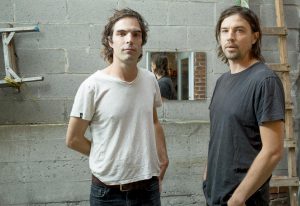
The Barr Brothers indie folk band includes brothers Andrew Barr on vocals/drums and Brad Barr on guitar/vocals, bassist Morgan Moore, and harpist/vocalist Eveline Gregoire-Rousseau. The group has been nominated for several Juno Awards, and their influences include Delta blues, Appalachian songs, and African music. They starred twice on the Festival’s main, Scène TD stage, where they performed for crowds of over 50,000 people.
Although they might be based in folk music, at their concert, the played so much more, including rock. The show began with “Burn Card,” followed by “You Would Have to Lose Your Mind.” Brad Barr said, “It’s nice to be playing music again for people other than ourselves.” Brad discussed recently co-writing a song with composer Alfred Howard, titled “Co-Authors.” It was a powerful protest song about inequality in North America, and it’s part of Howard’s year-long project, Alfred Howard Writes, where Howard collaborated with numerous musicians and is releasing songs each day for 365 days. The proceeds will be split between the musicians and charities supporting social justice. To purchase music, and for more information, go to: www.alfredhowardwrites.com.
Sarah Vaughan 1983 Treasures of the Festival Concert
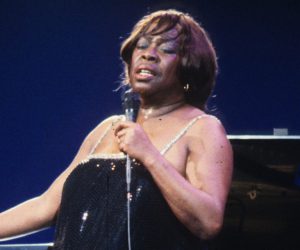
Legendary vocalist Sarah Vaughan had one of the most remarkable careers in the history of jazz, and it started in 1942 when she won the Apollo Theater Amateur Night competition. Nicknamed “Sassy” and The Divine One,” she won four Grammy Awards, including a Lifetime Achievement Award, and in 1989, she was honored with an NEA Jazz Masters Award. Her recordings included jazz, pop, Brazilian music, and the Great American Songbook. Considered to have one of the greatest and most recognizable voices in music, in 2012, The Sarah Vaughan International Vocal Competition (The SASSY Awards) was established in her honor, and is held yearly at the TD James Moody Jazz Festival at the New Jersey Performing Arts Center, continuing the legacy of this renowned singer.
At the concert, the band started with a jaunty number, then Sarah came out in a sparkling black dress and sang a rapid-fire improvisation, and she segued into the lovely ballad, “I’m Glad There is You.” Vaughan introduced the band, pianist Mike Wofford, double bassist Andy Simpkins, and drummer Harold Jones, made a few quips, then she sang a vivacious “I’ve Got the World On a String.” She followed up with a romantic “If You Could See Me Now.” Next came a lively “Just Friends” where Sarah scatted expertly, and pianist Mike Wofford’s solo was the perfect accompaniment. Between songs, she regaled the audience with witty banter. The show continued with a charming medley that included “But Not For Me,” “Our Love is Here to Stay,” “Embraceable You,” and “Someone to Watch Over Me.” It must have been hot on that stage, because Vaughan dabbed perspiration throughout, yet despite that, she was unflappable in her singing. The next song was an up-tempo “On a Clear Day.” She followed with a Duke Ellington/Billy Strayhorn song without words, “Chelsea Bridge” and said she was channeling saxophonist Johnny Hodges. She seemed to be having a blast! The show continued with the melodic “East of the Sun, West of the Moon” and a swinging “From This Moment On.” After a loud ovation, Sarah finished with a poignant “Send in the Clowns.” Although this concert was in the later part of Ms. Vaughan’s career, she had lost none of her powers, and this performance reinforced her reputation as one of the greatest.
In these strangely unsettling times, this virtual Festival was a marvelous reminder of the healing power of music. Whatever is going on in the world, music gives hope. Each night of the Festival, there were different pairs of contest winners in the audience at L’Astral, and weren’t they the lucky ones? Actually, all the viewers were lucky to be able to virtually enjoy this wonderful music. Even those who were not able to experience the Festival live will still be able see tapes of the events for FREE until July 30. To view the digital programming, go to: www.montrealjazzfest.com.









